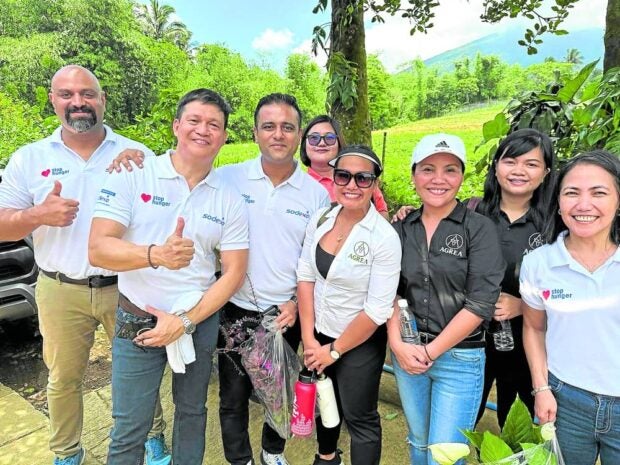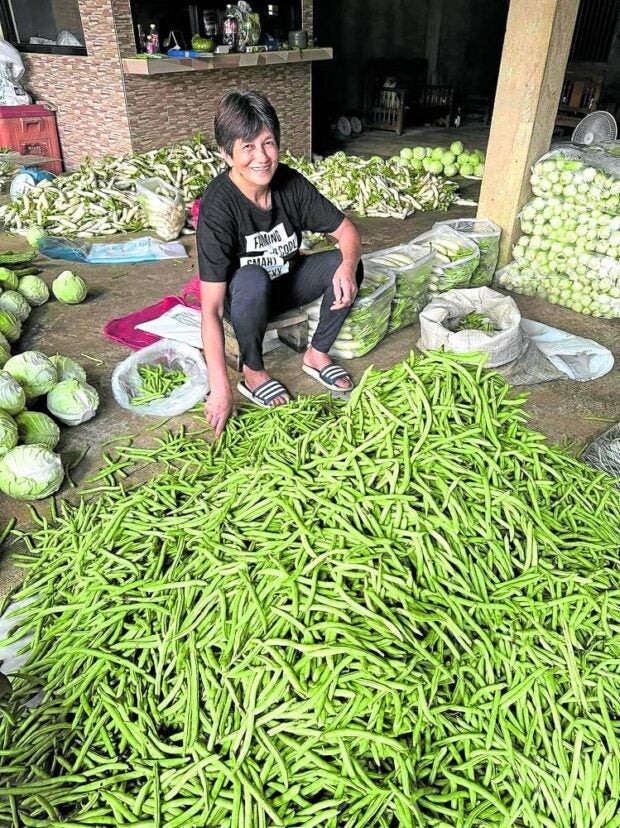Creating an ecosystem for sustainable farming

AGRI ADVOCATES (From left) Sodexo Philippines’ Rohan Kichlu, Baltazar Lajomand Paul Debaprateem; East West Seed’s Melanie Cruz; Agrea’s Cherrie Atilano and Sonia Gonzales; and Agrea Foundation’s Christine Jodloman
The agriculture sector plays a vital role in economic development. Yet in the Philippines, the latest labor survey released by the Philippine Statistics Authority says otherwise. The country’s farm sector shed 607,000 jobs from March 2022 to March 2023, topping the list of five sub-sectors with the largest layoffs.
Adding fuel to the fire is the prolonged bout with food insecurity and severe malnutrition. In 2022, the Philippines ranked 67th out of 113 countries in the Global Food Security Index, a report released by UK-based publication The Economist.
Global organization Nutrition International says the Philippines is grappling with severe malnutrition, with a high prevalence of wasting, stunting, micronutrient deficiency and obesity among children and women. It estimated that the economy would lose almost $4 billion (P222.7 billion) annually if the country fails to introduce additional interventions to address malnutrition.
Leading integrated facilities management Sodexo On-site Services Philippines Inc. and agribusiness enterprise Agrea Agriculture Systems International Inc. recently announced an initiative to address food security and nutrition problems and boost farmers’ income.
Called the Nourishing Workforce Sustainably-Sourced from Well-Nourished Farmers (NWSWF), it aims to provide more than 60,000 healthy meals daily—and eventually, increase the number to 100,000 meals by the middle of this year —for employees across various industry segments such as business process outsourcing, manufacturing and services.
Licensed nutritionists will prepare hearty meals using fresh produce to be sourced directly from farmers. The meals will be served at commissaries run by Sodexho.
Agrea will pay farmers based on the current prevailing farm-gate price or the selling price between farmers and traders, largely dictated by the latter. To date, commodities are actively sourced from 2,000 farmers formed as an association.

FARMER LEADER Vergie Bustarga of Majayjay, Laguna sorting out vegetables as part of postharvest facility. —CONTRIBUTED PHOTOS
Improving livelihood
“Traditionally, farmers sell to traders at low prices but Sodexo provides an ecosystem to support local farmers get better prices for their produce, thus supporting local economies,” says Sodexo managing director Paul Debaprateem.
“Besides, we want to give more to them and their families by giving them job opportunities and equipping them with the knowledge and skills to enhance employability. This initiative will help increase farmers’ income as producers and consumers simultaneously and provide opportunities for a better livelihood,” adds Debaprateem.
Cherrie Atilano, Agrea president and CEO, says their women-owned social enterprise has created an ecosystem for sustainable farming and a holistic approach to agriculture, with a focus on producing food in a sustainable and environmentally friendly way.
“We are very grateful to have Sodexo Philippines as a valuable partner in our shared advocacy to create a sustainable, resilient and accessible food system with a lesser adverse impact on the environment. I am confident that we will continue this alliance for a long time,” Atilano says.
This sustainability program observes a circular economy as kitchen waste from commissaries tapped to cook the meals will be collected and converted into organic compost that will be donated to the Payatas slum community in Quezon City. In turn, Payatas’ Women Food Producers Association will use the compost. Some 200 women are trained to establish urban farms as their source of food to survive the pandemic and sustain the feeding program for malnourished children in the slum.
Agrea’s farm school trains both the rural farmers and the women urban food producers on values formation, sustainable agriculture, financial literacy, health and nutrition as well as the basics of agribusiness, equipping them with the proper knowledge to make their business profitable and sustainable.
Debaprateem says this initiative will not only reduce the country’s reliance on imported food items but will also lessen the negative impacts of agricultural practices on the environment.
“By buying directly from them, our dependency on imported agricultural goods is reduced, with the result that the carbon footprint is lowered as well. This is a significant step to support Sodexo’s goal to reduce carbon emissions by 34 percent by 2040,” says Debaprateem.
Subscribe to INQUIRER PLUS to get access to The Philippine Daily Inquirer & other 70+ titles, share up to 5 gadgets, listen to the news, download as early as 4am & share articles on social media. Call 896 6000.